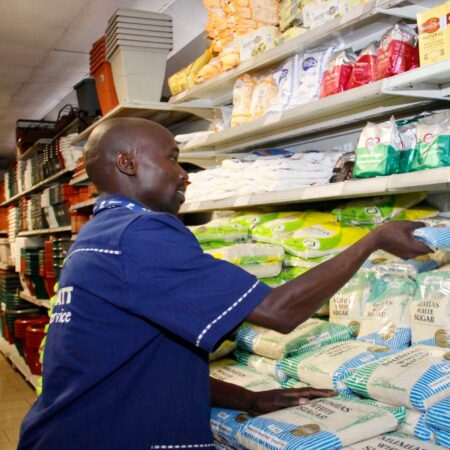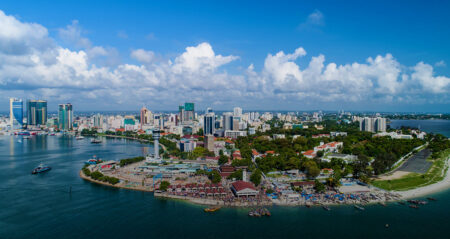African movies are transforming the entertainment landscape.
The award-winning African film, Vuta N’Kuvute (Tug of War), a 2021 Tanzanian creative, mesmerizing and nostalgic film, is unifying and bringing back the lost touch with history to big screens across African cinemas. African movies, just like this one, directed and co-written by a true African auteur, Amil Shivji, remind us how important filmmaking is towards integration and development.
Africa has more than 1.37 billion people across 54 countries, exhibiting various economic projections, political approaches and cultural diversity that makes the entire region iconic.
History has taught us a vital lesson that any country that has a strong creative economy exhibits strong national economic trends. Africa as a region is full of creativity, and the filmmaking landscape is one of the richest and most diverse areas, with the potential to transform stereotypes and economies and cement identity in communities.
By 2021, Africa had a collective GDP of $2.7 trillion. The entire chain of producing and distributing movies is essential and transformative.
According to a UN Education Scientific and Cultural Organisation (UNESCO) 2021 report, Africa’s film and audio-visual sectors could create over 20 million jobs and contribute $20 billion to the continent’s combined GDP.
Over the past decades economic blocs such as the Southern African Development Community. (SADC) and East African Community (EAC) have exploited the vitality of inter-regional trade and enabled integration to percolate through and made trade unions, business persons and local tourists participate fully in building economies.
The creative sector is yet another field that comes to the fold with a rather unique and potent device that connects people of different cultural orientations and walks of life through one key feature—visual storytelling.
Why integrate?
Africa, as a fast developing region, has been crafting a strategic integration approach. In 2019, the African Union (AU) designed the 7th of July every year for the continent to celebrate “African Integration Day”.
READ: Global studios, streamers turn to Africa as bastion of entertainment
In this spirit, African nations use the day to celebrate major achievements attained in the regional and continental integration process and ponder over critical lessons learned.
The journey to realize the continent’s integration is paved with success stories that show how integration could be Africa’s gateway to excellence in all spheres of development.
The African Continental Free Trade Area (AfCFTA) was the first milestone attained in the wake of the integration ambition.
The AU argues that integration is a crucial aspect of the continent to become an economic community. For that to happen, six successive stages must be taken, which include the strengthening of sectoral cooperation, the creation of regional free trade areas, the establishment of a continental customs union, a common market and a monetary and economic union.
Further, the AU noted that over the last two decades, Africa had registered a 4.6 per cent growth rate on average, despite economic challenges faced over the past years
AU argues that integration can play a crucial role in fostering inclusive growth and structural transformation.
Among crucial aspects rallied by the AU is enhancing the region’s cultural diversity, which gives Africa ample room to expand on our strengths, capitalize on opportunities to exchange knowledge and ideas and impact the economies of communities.
African films are an integral part of cultural expression and integration. If used strategically, they can foster better relations, amplify the region’s strength and motivate communities to take collaborative actions that would be mutually beneficial.
The Tanzanian film Binti (2021) directed and co-written by a woman filmmaker has triggered conversations on gender norms, gender-based violence and the role of women in urban settings. The filmmaker, Seko Shamte is stimulating the industry which is male-dominated and has inspired other young filmmakers on achieving social impact in visual storytelling. The mesmerizing movie is now available on Netflix and leading the way for others to showcase their stories as it is one of the few entrants on the global platform.
The Ugandan real-life-inspired movie, Queen of Katwe (2016), sparked interesting conversations and uptake on women’s and girls’ roles in board games particularly chess, challenging the stereotypes of chess being a foreign game and spring-boarded the domestication of the game in Uganda.
African movies
The African filmmaking industry is a sleeping giant and an un-mined gold mine. According to the United Nations, the sector employs at least five million people and contributes $5 billion in GDP across Africa. These numbers depict how big and lucrative African movies could be.
Neria, Yellow Fever, Aki Na Ukwa, Totsi and Binti have all impacted people’s lives, inspired necessary steps to change behaviours, addressed destructive stereotypes that block Africa’s development and garnered decent profits in cinema receipts.
Nigeria, South Africa, Ghana, Kenya and Tanzania are among the region’s top production spheres in the film industry.
Nigeria has over one million people employed in the movie industry, which produces 2,500 films per year.
Tanzania has at least 30,000 people employed in the filmmaking business. According to the Tanzanian Minister of Culture, Arts and Sports, Mohamed Mchengerwa, the entertainment and arts industry contributes at least 19.4 per cent to the economy. In that fact, filmmaking is an essential part of regional integration.
By April 2022 alone, Tanzania saw more than 1,700 films registered in the nation’s film board for grading.
READ: Tanzania’s booming entertainment and media industry
Tanzania, as one of the fastest-growing economies, has demonstrated remarkable growth on the creative front—displaying its best talents in music to an extent some of its best performing talents integrate the nation’s Swahili language to other cultures, export studio services abroad, collaborate with the best minds and experts the competitive market can churn out.
In that same spirit, the Tanzanian masterpiece period drama Vuta N’Kuvute (Tug of War) is a plain view example of how film integrates Africa in a very creative but potent manner. The film took different stops and turned across the globe, recruiting the best industry performers locally and abroad.
The 2021 film was a product of the hard labour of a diverse production crew, with multiple nationalities from South Africa and Kenya and funding from Doha.
This film is a crystal clear example of how the creative sector pumps life into job creation, understanding communities’ history, unifying people abroad, especially diaspora and inspiring positive mindsets.
Vuta N’kuvute, made out of a screenplay adapted from the novel written by Adam Shaffi, took the world by storm. It received a standing ovation during its premiere in Canada’s renowned Toronto International Film Festival and on five other big screens across the world including the Official Selection Centrepiece Film New York African Film Festival 2022, Winner Visions Sud Est Post-Production Fund 2020 (Switzerland) and Winner World Cinema Production Fund 2019 (Germany).
Regionally, Vuta N’Kuvute movie became a big hit and got screened in Burkina Faso, and took home the FESPACO award; it was also Winner Best Long Fiction Mashariki African Film Festival 2021 (Rwanda). Vuta N’Kuvute has recently also bagged multiple awards in the 2022 Zanzibar Film Festival (ZIFF).
At the end of the day, filmmaking, as a lucrative arena in the creative industry, does a great job of inspiring and galvanizing necessary resources and ideas to realize the African economic community’s ambition.
It is time to write, produce, direct, promote, market, and distribute globally and screen African movies for Africa and the rest of the world. The time has come for Africa movies on Netflix to be leading in viewership.
Read: Nyara: High-budget movie spiking industry in Tanzania











